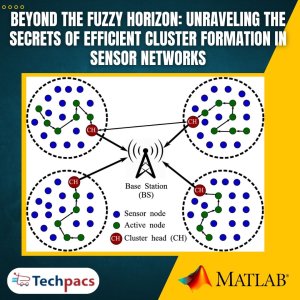A Novel Energy-Efficient Cluster Head Selection Approach using GWO Optimization
Problem Definition
The traditional work in the field of network clustering protocols has been plagued by various issues that hinder the performance of the network. Despite numerous authors attempting to improve the energy efficiency through optimization techniques, there are still major limitations such as energy consumption and delays in data delivery that need to be addressed. As a result, there is a pressing need for further research and development in this area in order to enhance the overall network lifetime. By identifying and tackling these key pain points, significant advancements can be made in improving the efficiency and effectiveness of network clustering protocols.
Objective
The objective of the proposed work is to address the issues faced by traditional energy efficient clustering protocols by enhancing the cluster head selection parameters and utilizing the grey wolf optimization technique for data aggregation. By optimizing these processes, the aim is to improve network performance, increase efficiency, and extend the overall network lifetime. Through the incorporation of advanced algorithms like GWO, the project seeks to offer a novel solution to the existing problems in network clustering protocols and contribute to the field of energy efficient networking.
Proposed Work
The proposed work aims to address the issues faced by traditional energy efficient clustering protocols in improving network performance. By enhancing the cluster head (CH) selection parameters, the protocol can better evaluate nodes based on factors like residual energy and transmission distance. The selection of CHs based on these parameters ensures that nodes with higher energy levels and shorter distances are chosen, ultimately leading to improved network lifetime. Additionally, the use of the grey wolf optimization (GWO) technique for data aggregation further enhances the protocol's efficiency by replacing the traditional ACOPSO algorithm.
By focusing on optimizing CH selection and data aggregation using advanced algorithms like GWO, the proposed work seeks to contribute to the field of energy efficient clustering protocols.
The rationale behind choosing GWO lies in its ability to effectively optimize the CH selection process and improve the overall performance of the network. By incorporating these innovative techniques, the project aims to achieve the objective of enhancing network lifetime and addressing the shortcomings of traditional approaches. Ultimately, the proposed work offers a novel solution to improving network performance through the application of optimization techniques and advanced algorithms.
Application Area for Industry
This project can be utilized in a variety of industrial sectors such as smart agriculture, smart cities, industrial IoT, and environment monitoring. In smart agriculture, the proposed energy-efficient clustering protocol can help in optimizing the deployment of sensor nodes in the field to monitor soil moisture, temperature, and other parameters. By selecting cluster heads based on factors like energy and transmission distance, the network lifetime can be significantly extended, allowing for continuous monitoring and data collection.
In industrial IoT, the CH selection parameters can be leveraged to improve the efficiency and reliability of data transmission in manufacturing plants or supply chain management systems. By using the grey wolf optimization model for data aggregation, the network can reduce data redundancy and improve overall communication performance.
Overall, the benefits of implementing these solutions include enhanced network lifetime, improved data delivery, and optimized energy usage, which can lead to increased productivity and cost savings in various industrial domains.
Application Area for Academics
The proposed project can significantly enrich academic research, education, and training by introducing an energy-efficient clustering protocol with an enhanced CH selection strategy. This new approach aims to improve network performance and lifetime by considering parameters such as energy levels and transmission distances of nodes.
In terms of relevance and potential applications, this project can offer innovative research methods and data analysis techniques within educational settings by using the GWO algorithm for data aggregation. Researchers, MTech students, and PhD scholars in the field of networking and optimization can benefit from the code and literature of this project for further exploration and experimentation.
By focusing on enhancing network lifetime through improved CH selection parameters and utilizing GWO for data aggregation, this project covers the technology and research domain of wireless sensor networks and optimization algorithms.
Researchers and students can leverage the findings and methodology of this project to advance their own research initiatives and enhance their understanding of energy-efficient protocols in networking.
For future scope, potential advancements could include exploring additional optimization algorithms, conducting simulation studies in different network scenarios, and integrating machine learning techniques for further improvements in network performance. This project lays a solid foundation for ongoing research and education in the field of wireless sensor networks and optimization algorithms.
Algorithms Used
The Grey Wolf Optimization (GWO) algorithm is utilized in the project as a data aggregation model to enhance the energy efficiency and overall performance of the network. GWO is applied in the CH selection process to replace the traditional ACOPSO algorithm. It works by selecting cluster heads based on parameters such as energy levels of nodes and transmission distances. Nodes with higher residual energy have a greater chance of being selected as a cluster head, as they are capable of covering longer distances and potentially improving the network lifetime. By integrating GWO into the protocol, the project aims to increase the efficiency of data aggregation and ultimately enhance the network's overall performance.
Keywords
SEO-optimized keywords: wireless network, performance optimization, parameter optimization, energy efficient clustering protocol, CH selection parameters, CH selection strategy, grey wolf optimization (GWO), data aggregation model, traditional ACOPSO algorithm, network lifetime enhancement, residual energy, transmission distance, network performance, network parameters, network throughput, network latency, quality of service, resource allocation, optimization algorithms, energy efficiency, network management.
SEO Tags
wireless network, performance optimization, parameter optimization, algorithm enhancement, energy efficient protocol, CH selection parameters, transmission distance, residual energy, data aggregation model, grey wolf optimization, ACOPSO algorithm, network lifetime enhancement, network performance evaluation, optimization techniques, optimization algorithms, network parameters, network throughput, network latency, wireless communication, quality of service, resource allocation, research scholar, PHD student, MTech student.
| Shipping Cost |
|
No reviews found!

















































No comments found for this product. Be the first to comment!